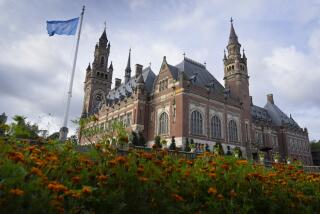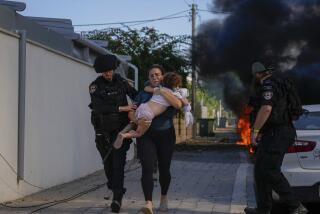War Crimes in Bosnia: Justice Waits
- Share via
Gen. Ratko Mladic, the Bosnian Serb warlord, is reported holed up in a mountain bunker and drinking heavily. Dusan Tudic, accused of murder, rape and torture of Bosnian Muslims, sits in a Dutch jail. These two and 50 others--ethnic Serbs and Croatians and one Muslim--have been indicted as war criminals, the worst of a brutal lot in a conflict without pity. None should be given these men if they are found guilty.
Only Tudic, whose alleged crimes are too sadistic to be described here, is in custody. He and the 51 others have been indicted by the United Nations tribunal at The Hague, but the leaders of Serbia, Croatia and Bosnia-Herzegovina, who signed a peace treaty in Paris Thursday, so far have not turned over any indicted countrymen, despite a treaty requirement that they do so.
Indictments were returned in absentia against 45 Bosnian Serbs, including Tudic. Many of their crimes were committed early in the war, during the initial frenzy of “ethnic cleansing,” a phrase the Nazis might have coined. The campaign involved driving Muslims from their homes, killing those who resisted and raping the women in a deliberate assault against Muslim genetic lines. Where they could, the less well-armed Muslim forces took revenge by attacking Serbian civilians, and Croatians were alternately aggressors and victims in similar outrages.
The American, British and French troops of the NATO peacekeeping force have begun deploying in Bosnia with no orders to seek out war criminals. An indicted thug would probably have to wave a warrant for his arrest under the nose of NATO security to be taken into custody, Western diplomats say.
At the state level, Croatian President Franco Tudjman, an ultranationalist, probably would not countenance turning over any of his soldiers, and the U.N. has little influence over him. Serbian President Slobodan Milosevic is more exposed. Most of the accused are Bosnian Serbs, agitated by Milosevic’s regime. And the U.N. Security Council brought the Serbian economy to its knees with a trade embargo for arming the Bosnian cousins. The threat could be raised again if none of the indicted men are turned over. Nevertheless the prospects for compliance are dim.
Times correspondent Dean E. Murphy quoted Konstantin Obradovic, a professor of international law, on the issue: “They [Serbian, Croatian and Muslim leaders] will make the appearance of greater cooperation, but in fact they will do everything to sabotage it. There is a fear that anyone who goes to The Hague will open their bags and disclose everything there is to know.”
The world community must press for compliance. But even without it, history shows that sometime, somewhere there is a bullet waiting for men like these. Mladic: Hunted or ignored?
More to Read
Sign up for Essential California
The most important California stories and recommendations in your inbox every morning.
You may occasionally receive promotional content from the Los Angeles Times.













